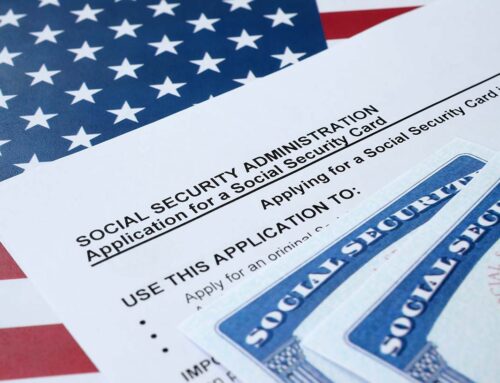 If you’re getting Social Security retirement benefits, some members of your family may also qualify to receive benefits on your record. Your ex-spouse or spouse may receive a monthly payment of up to one-half of your retirement benefit amount if they qualify. These Social Security payments to family members will not decrease the amount of your retirement benefit.
If you’re getting Social Security retirement benefits, some members of your family may also qualify to receive benefits on your record. Your ex-spouse or spouse may receive a monthly payment of up to one-half of your retirement benefit amount if they qualify. These Social Security payments to family members will not decrease the amount of your retirement benefit.
Spousal benefits can be attained even if you didn’t qualify for your own benefits. However, if you did qualify for your own benefits, under certain circumstances you can take spousal benefits or file a restricted claim, which allows your personal benefits to continue to grow.
If your spouse qualifies for spousal benefits on their own record, that amount will be paid first. If the benefit on your record is higher, your spouse will get an additional amount off your record so that the combination of benefits equals that higher amount.
Suppose your spouse was born before January 2, 1954 and has already reached full retirement age. In that case, they can choose to receive only the spouse’s benefit (restricted claim) and delay receiving their retirement benefit until a later date. This option allows their Social Security payments to potentially grow beyond 100%.
If your spouse is between age 62 and their full retirement age, the amount is permanently reduced by a percentage based on the number of months up to their full retirement age.
If your spouse’s birthday is on or after January 2, 1954, the option to take only one benefit at full retirement age no longer exists. If your spouse files for one benefit, they’ll effectively file for all retirement or spousal benefits. This type of filing is known as “deemed filing.”
If you haven’t applied for retirement benefits but can qualify for them, your ex-spouse can receive benefits on your record if you’ve been divorced for at least two continuous years. Additionally, if you’re divorced, your ex-spouse can receive benefits based on your record (even if you’ve remarried) if:
- Your marriage lasted ten years or longer
- Your ex-spouse is unmarried
- Your ex-spouse is age 62 or older
- The benefit your ex-spouse is entitled to receive based on their work is less than the benefit they’d receive based on your work
- You’re entitled to Social Security retirement or disability benefits
Questions to Discuss with Your Financial Professional:
- Am I eligible for spousal benefits?
- When can I claim spousal benefits?
- Does it hurt my spouse if I take spousal benefits?
It’s quite possible you have questions regarding eligibility, benefits, and even the impact on your own benefits. As financial professionals, we’re here to help you navigate this important retirement income. Contact us today at (540) 720-5656.
Adapted from SSA.gov1





 Amy Anderson joined the ILG Financial team in 2023 as the client relations coordinator. Her responsibilities include scheduling of appointments, annual check-up notifications, and annuity and required minimum distribution assistance. She is a graduate of Harding University with a degree in Computer Information Systems. Amy and her husband have two children and she enjoys reading, crocheting, music and spending time with her family.
Amy Anderson joined the ILG Financial team in 2023 as the client relations coordinator. Her responsibilities include scheduling of appointments, annual check-up notifications, and annuity and required minimum distribution assistance. She is a graduate of Harding University with a degree in Computer Information Systems. Amy and her husband have two children and she enjoys reading, crocheting, music and spending time with her family. Chase Lopez joined the ILG Financial team in 2020 as an advisor. Chase is a 2016 James Madison University graduate with a degree in management. Chase has been trained under the tutelage of Dave Lopez, who is not only the founder and managing member of ILG Financial, but also is Chase’s uncle and godfather. He also enjoys working alongside his cousin, Megan, who is Dave’s daughter. Chase, as a fiduciary, believes in putting his clients interests first, and building out plans for his clients where they can have a happy and fruitful retirement. He married his beautiful wife in February 2022 and both use most of their free time chasing around their little pup, Aurora.
Chase Lopez joined the ILG Financial team in 2020 as an advisor. Chase is a 2016 James Madison University graduate with a degree in management. Chase has been trained under the tutelage of Dave Lopez, who is not only the founder and managing member of ILG Financial, but also is Chase’s uncle and godfather. He also enjoys working alongside his cousin, Megan, who is Dave’s daughter. Chase, as a fiduciary, believes in putting his clients interests first, and building out plans for his clients where they can have a happy and fruitful retirement. He married his beautiful wife in February 2022 and both use most of their free time chasing around their little pup, Aurora. Jessica Carson joined the ILG Financial team in 2018 as an agent. Jessica and her husband have four children, two dogs, 3 barn cats, 5 chickens, and three parakeets. She indeed loves her children and pets! When not at work, Jessica enjoys playing the piano and cello as well as traveling and spending time outside with her family, hiking, fishing, and boating.
Jessica Carson joined the ILG Financial team in 2018 as an agent. Jessica and her husband have four children, two dogs, 3 barn cats, 5 chickens, and three parakeets. She indeed loves her children and pets! When not at work, Jessica enjoys playing the piano and cello as well as traveling and spending time outside with her family, hiking, fishing, and boating. Terri Center joined the ILG Financial team in 2019 as client services manager. She handles client records, application processing, and gathering information to provide a professional and friendly experience with all of our clients. Terri is a graduate of Oakland University. She is married and has two children. She enjoys hiking, family time, and puzzle challenging video games. She also likes to share her creativity in her canvas paintings and sewing projects.
Terri Center joined the ILG Financial team in 2019 as client services manager. She handles client records, application processing, and gathering information to provide a professional and friendly experience with all of our clients. Terri is a graduate of Oakland University. She is married and has two children. She enjoys hiking, family time, and puzzle challenging video games. She also likes to share her creativity in her canvas paintings and sewing projects. Megan Jones joined the ILG Financial team in 2020 as marketing director. Megan and her husband live in Fredericksburg, VA with their German Short Haired Pointer, Gus. Megan is a graduate of Longwood University and holds a degree in communications. Megan is the oldest of Dave Lopez’s three children and not only enjoys working alongside her father, but also with her cousin, Chase, who joined the ILG Financial team in 2020 as an advisor. When not at work, Megan enjoys sitting on the back porch with family and friends enjoying food and music.
Megan Jones joined the ILG Financial team in 2020 as marketing director. Megan and her husband live in Fredericksburg, VA with their German Short Haired Pointer, Gus. Megan is a graduate of Longwood University and holds a degree in communications. Megan is the oldest of Dave Lopez’s three children and not only enjoys working alongside her father, but also with her cousin, Chase, who joined the ILG Financial team in 2020 as an advisor. When not at work, Megan enjoys sitting on the back porch with family and friends enjoying food and music.